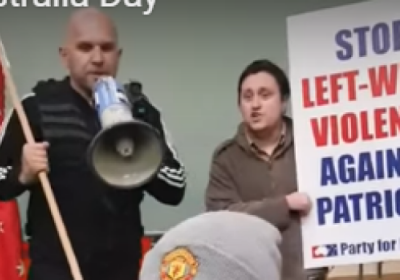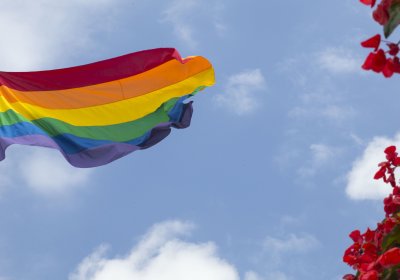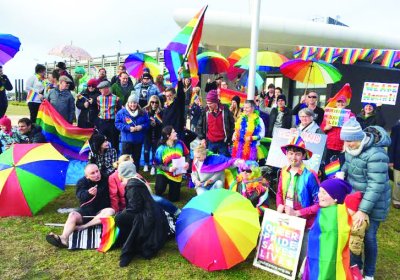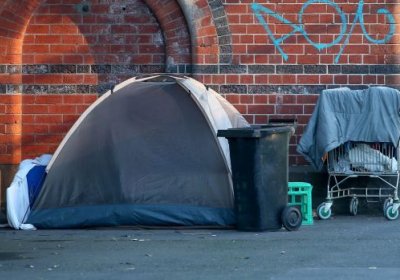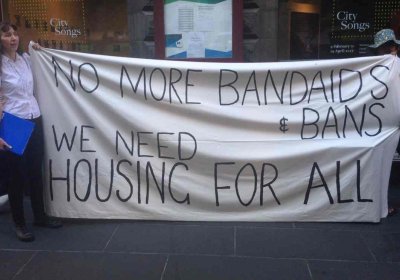Save The Preston Market Action Group are not giving up on saving one of Melbourne’s oldest outdoor markets from being demolished. Robert Hart reports.
Victorian councils and local government
Climate activists are planning a mass blockade of the upcoming International Mining and Resources Conference (IMARC) in Melbourne, with the support of local councils, student unions and the Victorian Greens.
On May 8, Bridgid O’Brien was elected a councillor of the City of Yarra following the resignation of another councillor. She will join Stephen Jolly as a second socialist on the council.
September 5 was a big day for Victoria’s extreme Right.
In the morning, three fascists, United Patriots Front leader Blair Cottrell, the Party for Freedom’s Neil Erikson and supporter Christopher Shortis, were all found guilty of inciting serious contempt of Muslims.
In the evening, nine protesters from Party of Freedom, armed with megaphones and clutching signs reading "Love it or leave it", stormed the Yarra Council meeting to oppose its decision to stop referring to January 26 as Australia Day and to cease holding any citizenship ceremonies on that day.
What local councils do or don’t do on January 26 has burst into the national political debate, and what a good thing that is. No matter the frantic condemnation from the corporate media or the pompous and arse-about assertion by Prime Minister Malcolm Turnbull that councils were “using a day that should unite Australians to divide Australians”.
These opponents of an honest examination of Australia’s history may want to shut down the conversation but the opposite has happened.
The Andrews Labor government’s euphemistically titled Public Housing Renewal Program aims to sell a range of public housing estates across inner Melbourne in a series of public private partnerships.
These deals will hand over large swathes of land currently owned by the Department of Housing to developers and allow the construction of high rise apartment buildings. The state government wants to remove planning controls over these developments from local councils by creating a special planning committee to oversee the developments within the department.
Warrnambool City councillors unanimously voted to support marriage equality on July 3. Councillor David Owen, who instigated the motion, said backing marriage equality would be a “symbolic act, in support of a very important social justice issue” and align it with 48 other councils in Australia.
As the federal government continues to shirk its responsibility to legislate for marriage equality, councils are increasingly being called on to take a lead.
On April 26, former mayor Councillor Rose Hodge moved a motion that the Surf Coast Shire Council fly the Pride flag continuously from May 17 (International Day Against Homophobia, Biphobia, Intersexphobia and Transphobia) until the federal government passed a law in support of marriage equality.
Eighty tenants and supporters rallied at the Northcote public housing estate on June 24 to protest plans to evict the tenants and demolish their homes.
Northcote is one of nine public housing estates the Victorian Labor government wants to demolish. It wants to sell the land to private developers who would build high rise units. Some "social housing" would also be built.
Addressing the rally, Aboriginal activist and public housing tenant Viv Malo linked the planned evictions to the history of dispossession of Aboriginal people.
A public forum on March 17 discussed the implications of Melbourne City Council's proposed amendments to Activities Local Law 2009.
The changes would broaden the definition of “camping” to mean people currently sleeping rough could be forcibly moved on by police and face fines for possessing a piece of cardboard or bedding. The city of Melbourne would be effectively criminalising homelessness.
1. People choose to be homeless
By “banning” homelessness, Melbourne City Council is implying it is a “choice”. Homelessness is usually the cause of a range of interconnected factors, some of which include poverty, unemployment and family violence. There is also a shortage of affordable housing and jobs that pay a living wage.
Protesters gathered outside Melbourne’s Town Hall on February 7 ahead of a volatile council meeting to discuss proposed changes to council laws that would effectively make homelessness illegal in the community.
Camping is currently banned in Melbourne if a person uses a tent, car, caravan or other structure. Councillors voted 5–4 to broaden the definition of camping, a move legal experts say could lead to rough sleepers being forced to the outskirts of Melbourne or fined for sleeping with nothing more than "a cardboard box and blanket".
- Page 1
- Next page



